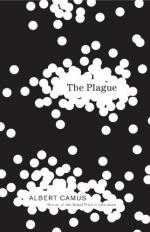
|
| Name: _________________________ | Period: ___________________ |
This test consists of 15 multiple choice questions and 5 short answer questions.
Multiple Choice Questions
1. What becomes the last resort for disposal of corpses?
(a) Cremation.
(b) Mass burial.
(c) Taken to a new cemetery in the desert.
(d) Burial at sea.
2. Who does Rieux confide in?
(a) Grand.
(b) Fr Paneloux
(c) Cottard.
(d) His mother.
3. How do his friends try to help Grand?
(a) They help him try to find a satisfactory opening sentence for his novel.
(b) They smuggle in paper for his novel-writing.
(c) They help him with his grocery shopping.
(d) They try to organise a promotion for him at work.
4. Who receives an invitation to the sermon?
(a) Dr. Rieux.
(b) M. Cottard.
(c) The Prefect.
(d) Dr. Castel.
5. In his struggle of conscience, who does Rambert resemble?
(a) Dr. Castel
(b) Dr. Rieux
(c) Fr Paneloux
(d) The author, Albert Camus.
6. Where is Grand taken for treatment?
(a) The Catholic hospital.
(b) A military hospital.
(c) Dr Rieux's home.
(d) Rieux and Tarrou look after him at home.
7. What is the result of this treatment?
(a) There is no change in his condition.
(b) The boy recovers quickly.
(c) The boy takes longer to die.
(d) The formula is patented.
8. Having made his decision, what must Rambert now give up?
(a) A large income.
(b) His nationality/citizenship.
(c) Happiness with his wife.
(d) His job at the newspaper.
9. How is Rambert's wife arriving?
(a) By ship from Marseilles.
(b) By car.
(c) By train.
(d) By air from Casablanca.
10. Who ecomes general secretary to the squads of volunteers?
(a) M. Cottard.
(b) Dr. Castel
(c) M. Tarrou.
(d) M. Grand
11. Why are individual burials dispensed with?
(a) The death rate is too high to keep pace.
(b) The gravediggers are threatening to go on strike.
(c) The cemetery is full.
(d) People cannot afford expensive funerals.
12. What is the prime factor in his decision?
(a) His conscience.
(b) His love.
(c) Dr. Rieux's support.
(d) His finances.
13. What does Rieux confide?
(a) That he is in despair and contemplating suicide.
(b) That he has been profiteering from the plague.
(c) That his wife's condition has worsened.
(d) That his wife is getting much better.
14. What does Rambert anticipate happening when he meets his wife again?
(a) Instant happiness.
(b) She will worry that he has lost weight.
(c) He has changed, so will reject her.
(d) Things will be over between them.
15. With whom is Fr Paneloux billeted?
(a) M. Cottard.
(b) Cardinal Richelieu.
(c) An old woman.
(d) Dr. Rieux.
Short Answer Questions
1. What seems to be an important factor in the reduction of plague deaths?
2. Why is M. Othon's release from camp delayed?
3. What does Rieux do with Grand's manuscript?
4. What news does his mother give to Rieux?
5. What is up with Grand?
|
This section contains 510 words (approx. 2 pages at 300 words per page) |

|




